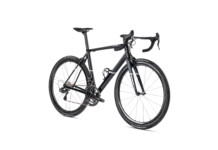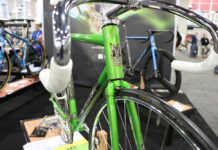Innovator and Cycling Industry Legend Phil Wood Passes
By Greg Overton
Phil. One word mentioned in a conversation regarding bicycle bottom brackets or hubs is all that’s required to more or less finish the conversation. Phil Wood introduced the first sealed bearing bicycle hub in 1971, and a legendary company was born. The quality and durability of Phil Wood & Co. products, which also included the first sealed bearing bottom bracket and pedals and a host of other well designed and rock solid products always reflected the company motto to ‘Build it Strong, Keep it Simple, Make it Work’. The man who started his namesake company was driven to innovate back then by the poor quality and unavailability of bearings for the hub in his daughter’s bicycle wheel. A conversation with another legendary figure changed the course of his life and the cycling industry. Phil Wood passed away from cancer at his farm near Baxter, Iowa, on March 19, 2010. He was 84 years of age.
Out of frustration back in the early 70’s, Wood turned to Spence Wolf, himself an innovator and component maker, and proprietor of the famous Cupertino Bike Shop, to search for replacement bearings for his daughter’s bicycle wheel. The ensuing conversation evolved into Wood asking Wolf why no one had developed hubs with sealed cartridge bearings. Wolf’s reply was, ‘I don’t know, you should do it.’ When Wood later left the shop, he quickly turned and stepped back inside and asked Wolf how many he should make. After taking a second to recall what it was that Phil was asking about, Wolf replied, ‘Make fifty.’
At the time, Phil Wood was a restaurant equipment employee and machinist, solving design and maintenance problems for Food Machinery Corporation. But it wasn’t very long before he was the founder and proprietor of San Jose based Phil Wood & Co. and maker of the bicycle industry’s first modern hubs with sealed bearings and oversized aluminum axles. Soon, Wood’s company would build a name for itself as the upgrade of choice, even the choice over world leader Campagnolo in hubs, and would follow that with sealed bearing bottom brackets, and pedals. Over the ensuing decades, Phil Wood would introduce a wonderful spoke cutting and threading machine that would become the industry standard, the first ovalized tubing specifically designed for tandem bicycle frames, and the staple of shops and home mechanics alike, Phil Wood Grease in the familiar green tube, and Tenacious Oil in a similarly colored bottle. In my own three decades in the bicycle industry, I have yet to hear a disparaging comment on the design or quality of a Phil Wood product or a complaint directed at the company itself.
It is extremely rare in this industry that a company can achieve what this one has achieved. The company has remained small, employing only 20 people, and has retained all production in-house in San Jose, resisting the temptations to outsource production abroad, and to maintain a level of recognition and reputation that has always been at the highest level. Even the simple trademark logo of ‘Phil’ in a cursive signature style, painted in red on its products has remained the same and still signifies quality, no frills, and perhaps a lifelong product. Stories of Phil hubs and bottom brackets working wonderfully for decades are not uncommon. Many tourists have logged tens of thousands of miles in all types of conditions on their Phil hubs and bottom brackets. And just as many racers have had similar service from their Phil components, which are as beautifully finished as they are beautifully designed.
Along the way, Phil Wood & Co. made pedals and one of the first disc brakes ever designed for bicycles. These were exemplarily innovative and well made also, but the progress of change sounded their death tolls as clipless pedals came along, and the world was not yet ready for disc brakes when Phil Wood was. Phil would regularly make his company’s services available to high school, college and university design students and inventors, making prototypes and offering assistance. And even though his products were unique in many ways, and certainly eligible for many patents, Wood chose never to patent them, making them available to anyone, and at times offering advice and help to competitors.
Wood sold the business to Peter Enright and a group of investors and employees in 1991, and a short time later he and his wife Lavada moved to a farm near Baxter, Iowa, where he remained out of cycling and in retirement farming. Enright has continued the legacy that Wood began, holding tight to the company’s motto, while staying current and sometimes ahead of the fast moving cycling industry in the past two decades. The company has developed new lubricants, new alloys, and new designs, and is still considered to be of the highest quality and one of the most sought after product lines for discerning cyclists.
Company sales are kept close to the vest, but Phil Wood & Co. marked its surpassing of the $2 Million annual sales figure early in this decade and has continued to grow since. In a 2007 interview with the San Jose Business Journal, General Manager Garrett Enright was asked to comment on the number of items produced of any one product line in a year, and he could not quantify it in those terms. Instead, he measures production in the amount of raw material used per week, commenting that in the early days the company went through about 500 pounds of aluminum every two weeks. Today it produces products from more than 2,500 pounds weekly.
“We’re always back-ordered,” said Marketing Director Darla Sasaki in that same interview. “When the drawer is empty, we just make more.” And at Phil Wood & Co., they just continue to build it strong, keep it simple, and make it work.
A memorial service for Phil and his wife, Vada, who passed away December 18, 2009, will be held on April 17, at the Calgary Baptist Church in Los Gatos, California, at 11:00 a.m. Phil is survived by their six children.





